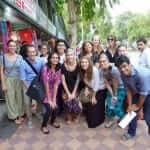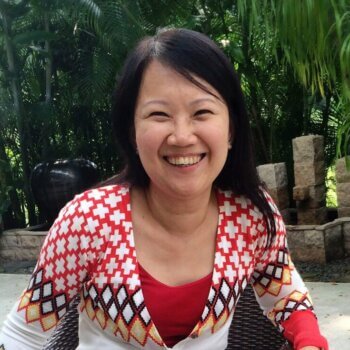Prukalpa is the co-founder of Social Cops, a technology social enterprise that harnesses citizen voice as a powerful resource and builds synergystic, connected communities. She started building communities using technology from the age of 10 when she hardcoded an HTML website for Harry Potter Fans around the world. In her university days, she founded the Singapore Entrepreneurship Challenge which unites over 150+ startups and youth in Singapore every year and led teams of 20+ people in university. A certified workaholic, you’ll probably find her penning down thoughts or reading when she’s not working. She also writes a monthly column at Inc42. She has previously worked in the business divisions of Goldman Sachs and Exxon Mobil. She studied Engineering and Entrepreneurship at the Nanyang Technological University, Singapore and is currently based out of New Delhi, India.
This week, the Asian Entrepreneur interviews Prukalpa about her entrepreneurial experience working on Social Cops and her thoughts on Asian startups.
What exactly is Social Cops?
Communities are disengaged – citizen voice is not harnessed in any form except media & forums, public agencies have no way of connecting with citizens and there is a lack of a channel to enable data driven decisions. We use web, mobile and voice to crowd source citizen data, engage citizens, and analytics to create connected, synergistic communities.
We empower stakeholders and change makers – be it public agencies, NGOs or just citizen groups to pick up the platform, decide what issue and demographic they want to engage and deploy the platform (depending on whether voice, SMS, Web and Smartphone channels suit them best)
How did you come up with the idea of Social Cops?
Social Cops started when we were in our final year university in Singapore. There were a lot of on-ground protests happening at that time and we saw that the public wanted to be actively involved in the community but their voices were not resulting in any long lasting change. On the other hand, we began to realize the impact of basic issues around us – In India alone 3 people die every hour due to accidents caused by bad roads. Poor waste management leading to diseases, Traffic Congestion leading to accidents, lack of access to public utilities – The basic nature of these problems and the magnitude of their impact frustrated and fascinated us… there needed to be a simpler way to solve these problems.
We took a train journey covering 12 Cities in 15 days. As we travelled through the country, we found one recurring theme. That our neighborhoods were filled with heroes – be it citizens, public agencies or companies who wanted to spearhead change in their communities.
The efforts of our heroes were fragmented, resource intensive and lacked actionable data. It was clear to us that the most sustainable solution would be one that allowed communities to solve their own problems.
Could you walk us through the process of starting up Social Cops?
Social Cops started when we were in our final year university in Singapore. There were a lot of on-ground protests happening at that time and we saw that the public wanted to be actively involved in the community b Social Cops started when we were in our final year university in Singapore. There were a lot of on-ground protests happening at that time and we saw that the public wanted to be actively involved in the community but their voices were not resulting in any long lasting change.
At Social Cops, we believe that with people comes power and with people comes chaos. How do we create community solutions to solve problems? As engineers, we saw ways that we could use the power of crowdsourcing and technology to solve community issues. On September 11th, 2012 we launched a crowd funding campaign on Indiegogo along with a Facebook campaign.
How has it been like managing the business since?
It has been possibly the biggest learning experience ever. Working on a startup is like a roller coaster – one moment you are jumping with happiness, the next moment you are down in the dumps. When you are running a startup – you are constantly learning to do things better, set up things, design things even. And I think that when you start taking it as a learning experience, it becomes enjoyable!
Did you find anything particularly difficult during the startup? How did you overcome it?
We started Social Cops when we were students in University. In order to raise our initial seed capital – we took part in almost all the student business plan competitions in the world. We started winning competitions around the world – winning grants from Microsoft and IBM. We won competitions like the Global Social Entrepreneurship Competition, IBM/IEEE Smart Planet Challenge and Singapore International Foundation Young Social Entrepreneurs.
We’ve even given presentations on Skype to Indian Competitions while in Singapore (and ended up winning about 5000$ via that!). I guess the biggest learning for us has been that if you’re genuinely passionate about what you do, things happen to make your dreams possible. An example of the opportunities life presents you with –as young social entrepreneurs, we were invited to present our solution for cities at the Asia Pacific Cities Summit in Taiwan to 102 Mayors from all over the world, which gave us some great leads for the future.
How was the initial reaction from the consumers? Did they buy into the product/service?
Social Cops has evolved interestingly since its inception. Most ventures in the crowdsourcing space failed due to the fact that there was no capacity in the community to solve issues raised. We spent over 6 months talking to various community stakeholders – citizens, corporates, NGOs and Public Authorities. Over this time we undertook various small-scale pilots – to understand what works and what does not.
We use crowdsourced data to install processes and systems that create systemic change. For example, in disrupting Sanitation- in our pilot with Municipal Ward 103 – Crowdsourced data from citizens is used as a checkpoint to monitor the efficiency of third party service providers for garbage collection. Crowdsourced citizen ratings are also used to identify the cleanest streets and thus identify the best “street cleaners” and award them – leading to higher performance rates! The most heartwarming moment for us was when one of the Street cleaners who was awarded (Mukesh) said to us “Madam, for the past 20 years I have been ashamed to tell my son what I do – and today for the first time my son is proud of me”
Our platform has been used by citizen groups like I Lead Ranchi in Ranchi to crowd source reports regarding broken streetlights. This led to an allocation of over 2.15 crores of resources towards fixing broken streetlights in Ranchi in a 2 month long campaign.
We have launched a campaign called SAFE to crowd source a neighborhood watch who can respond to a distress signal from women to make them feel safer on roads. SAFE is being spearheaded by local citizen groups in their own neighborhoods – most recently enabling a group of tenth graders to use the platform to engage the community around them on women’s safety.
We’re already working with brands such as PVR Nest and Michelin India, citizen groups in Delhi, Mumbai, Hyderabad and a variety of non-governmental organizations. Some of our initial templates such as our work with the Municipal Corporation of Delhi are already having us noticed and have city councils in other parts of the world seeking proposals from us to replicate initial templates on the platform.
Do you face a lot of competition in this industry? What is your strategy against your competition?
Many entrepreneurs generally make a mistake of building a solution before actually understanding the problem. We wanted to make sure that we understood the problem.
We have spoken extensively to organisations that have attempted to crowdsource citizen reports but have failed to scale to realise that simple Reporting Tools that crowd source citizen complaints die out at some point.
For example, The Delhi Municipal Corporation Facebook page allowed citizens to upload photos regarding complaints of garbage – and was very popular in the first few months of launch, but this initial user traction died down. Why? Because, on one hand – the councils were being overwhelmed with getting the problems reported fixed while on the other hand, citizens were getting tired of reporting problems.
We work differently – we don’t create noise where it is not needed. We work with stakeholders – public agencies and NGOs to crowdsource citizen voices in fields in which they can be used as a resource to solve real-life problems.
How have you managed to stay relevant in this industry?
We started Social Cops because there was a problem we saw and no one else was solving the problem. I think as long as we keep focused on creating community solutions and enabling communities to solve problems – we will remain relevant!
What are your future plans for Social Cops?
The Social Cops platform essentially aims to enable change makers – who can easily use the platform, deploy an initiative and use engagement tools to crowdsource, engage and analyze data. A cloud hosted platform, the aim is to Create a platform that enables anyone, at any part of the world to pick their issue and demographic – browse templates that work in other countries and deploy a quick technology solution to crowd source, engage and analyze data.
What do you think about startups in Asia?
I think startups in Asia should focus on solving asian problems – I see a lot of startups trying to clone startups in the Silicon Valley but I’m surprised not as many of them are trying to solve some of the biggest problems
Why did you decide to become an entrepreneur?
Marissa Mayer once said that at every point in your career you should decide to do what you will learn the most from. And something that scares you a little bit. I was graduating from university and had chances at working at some of the most sought after jobs but I felt that nothing would teach me as much as starting up.
In your opinion, what are the keys to entrepreneurial success?
Hustle and Passion – and a little bit of naivete and craziness.
Any parting words of wisdom for entrepreneurs out there?
People will tell you it won’t work – people will tell you that you will fail. Just keep doing your shit, and be passionate about it.
Connect
Website: www.socialcops.org
Facebook Page: https://www.facebook.com/socialcops


































